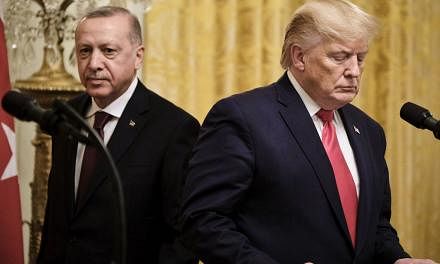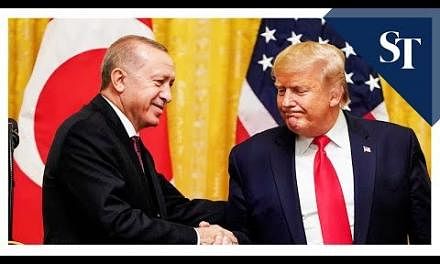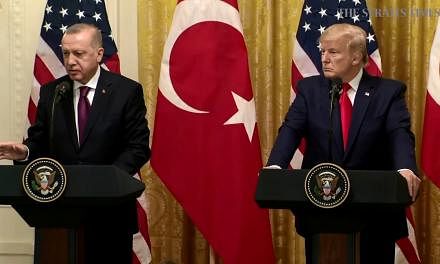WASHINGTON (NYTIMES) - The House voted overwhelmingly on Tuesday (Oct 29) to impose a series of sweeping sanctions on Turkey over its brutal assault on the Kurds in northern Syria, dealing its second bipartisan rebuke to President Donald Trump this month for pulling back American forces to allow for the Turkish incursion.
The measure drew broad support from Republicans, including the party's leaders, underscoring how Mr Trump's decision to effectively surrender US influence in the region and abandon Kurdish fighters has provoked the most vocal and intense criticism of the President by his own party since he was elected.
The vote was 403-16, with 15 Republicans and one Democrat, Representative Ilhan Omar of Minnesota, voting against the legislation.
Earlier this month, two-thirds of House Republicans joined with Democrats to censure Mr Trump's decision to withdraw troops from Syria, a move that enraged the President.
The legislation passed on Tuesday was sponsored by the top Democrat and Republican on the Foreign Affairs Committee - Representative Eliot Engel of New York, the chairman, and Representative Michael McCaul of Texas - and is an attempt by lawmakers to add teeth to what they consider an insufficient response from the Trump administration to Turkey's bloody offensive into Syria.
If enacted, it would prohibit the sale of arms to Turkey for use in Syria, impose sanctions on senior Turkish officials for their role in the military offensive against the Kurds, and require the administration to impose additional sanctions for the Turkish government's purchase of surface-to-air missile systems from Russia.
"Today Democrats and Republicans come together to demonstrate the strong, smart leadership that has certainly been lacking from the White House," Speaker Nancy Pelosi of California said.
Mr Trump last week lifted the modest sanctions he had imposed on Turkey's Ministry of National Defence and Ministry of Energy and Natural Resources after he announced that Turkey had agreed to a permanent ceasefire in Syria.
"The sanctions will be lifted unless something happens that we are not happy with," Mr Trump said.
That comment upset many lawmakers, who believe there is indeed much to be unhappy about.
Mr James Jeffrey, the President's special representative to Syria, told Congress that same day that US officials were investigating allegations that Turkish-supported forces had committed war crimes.
House Republicans on Tuesday largely did not discuss the administration's decision to lift sanctions, instead focusing their remarks on condemning President Recep Tayyip Erdogan and other Turkish officials.
"We let Turkey into Nato to protect them from the Soviet Union," McCaul said. "And now our Nato ally is buying Russian equipment, Russian military equipment and, through its invasion into Syria, threatening our allies."
Only a handful of libertarian-minded Trump allies have come to the President's defence.
Representative Andy Biggs of Arizona, the chairman of the ultraconservative House Freedom Caucus, argued in an op-ed for The Hill newspaper on Tuesday that Mr Trump's decision to "pursue diplomacy" is an approach that "seems to already be bearing fruit".
For now, the tougher sanctions approved by the House are likely to remain stalled. To enact them, the legislation would have to pass the Republican-led Senate and be signed by Mr Trump.
Senator Mitch McConnell of Kentucky, the majority leader, has said that, for now at least, he does not intend to bring up any such measure.
"We need to think extremely carefully before we employ the same tools against a democratic Nato ally that we would against the worst rogue states," Mr McConnell said in a speech.
He has introduced his own resolution rebuking the President for the withdrawal of troops from Syria, but that, too, is unlikely to draw broad support.
It would put Congress on the record warning against precipitous withdrawals of US troops from Iraq, Syria and Afghanistan, a provision that is intended to politically jam Democrats, who - notwithstanding their criticism of the President's pullback in Syria - have long called for pulling US troops out of the Middle East.
Some Republican senators, however, hope to press forward with sanctions. Senator Lindsey Graham, a South Carolina Republican, and Senator Chris Van Hollen, a Maryland Democrat, have introduced their own package of more punitive sanctions, with provisions that would cut off US military assistance to Turkey and bar Mr Erdogan from visiting the United States.
Republican senators have also privately pressed Mr Trump for months to impose sanctions on Turkey for its purchase of a Russian anti-aircraft system called the S-400.
Mr Trump already punished Ankara for acquiring the surface-to-air missile system in July by cancelling the sale of F-35 stealth fighter jets, but lawmakers in both parties believe Mr Trump is legally obligated by a 2017 law to go further and enact sanctions.
"On a strong bipartisan basis, Congress has made it clear that there must be consequences for President Erdogan's misguided S-400 acquisition, a troubling signal of strategic alignment with Putin's Russia and a threat to the F-35 programme," the top Republicans and Democrats on the Senate Foreign Relations and Armed Services committees said in a joint statement.
In July, Republican senators met with Mr Trump at the White House in the hopes of convincing the President to impose sanctions on Turkey.
But after a freewheeling meeting that often veered off-topic, the lawmakers left with the impression that the President was not interested in such a move, a Republican senator who attended said.











